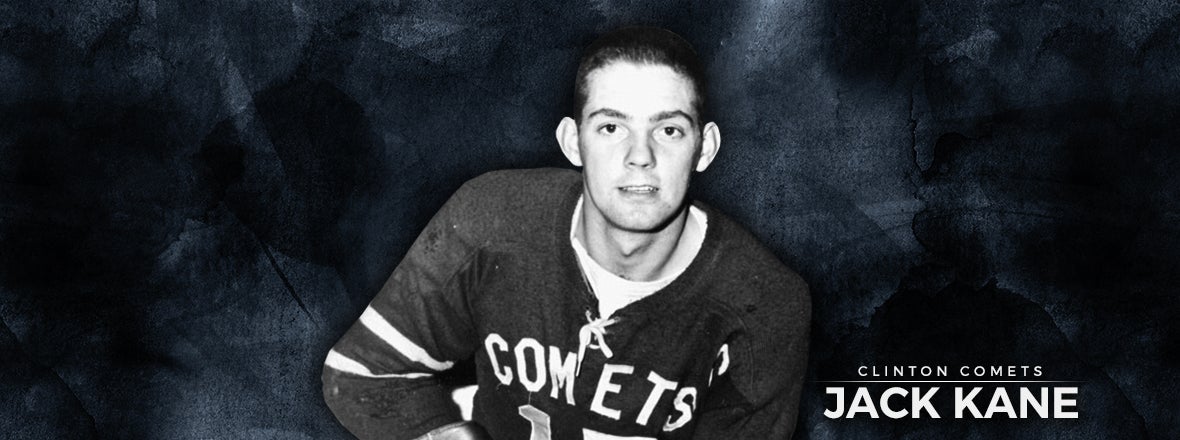
CLINTON COMETS & COMMUNITY: JACK KANE
Mar 9, 2017Jack Kane is a pretty good source on just how dominant the 1967-68 Clinton Comets were in the Eastern Hockey League.
Performance is often inversely proportional to fame. By today's standards, the 67-68 Clinton Comets, at the very least, would star in their own sports reality television program. Perhaps more appropriately, ESPN's 30 for 30 would come calling. Pat Kelly's squad was THAT good - off the charts head and shoulders above the other eleven teams in the EHL.
One of the reasons for the Comet’s eye-popping 57-5-10 (124 points) season was their star line, featuring Borden Smith at left wing, Billy Bannerman on the right, and captain Jack Kane down the middle at center. Although a grand team effort produced the ultimate team reward in the spring of 1968 with another EHL championship, Kane was the Comet’s maestro.
With one dozen seasons wearing the Comets jersey (60-72), Kane cruised to three 100-plus point seasons, while celebrating four EHL championships. In all, along with Kane's 137 points collected en route to the Comets winning the Finals (4-0) over the Charlotte Checkers, five of his teammates also topped the 100-point mark in 67-68.
"I had 12 pretty good years," says Kane, of his days dazzling opponents at the Clinton Arena and beyond. "We [Comets] had three lines. It didn't matter who we played. We had the confidence to win."
Being successful and believing in themselves went a long way to producing one of hockey's greatest team efforts of all-time – all leagues included. In listening to the captain recall the 67-68 season, one word stands above all others when describing the team – comradery.
Traveling by bus around the east to cities such as New Haven (Blades), and Long Island (Ducks), then for a 10-day road trip hitting arenas in Greensboro, Knoxville, and Nashville, bonding was expected. But, as Kane describes the closeness of that special Comets team, it was away from the arenas where the Comets excelled too.
"We were close. All of us got along. It was just a great time. All of us and our wives would get together at The Village Tavern. Warren Evans ran the place, and he treated us well."
Memories of going out after home Saturday night games at the Clinton Arena, and heading over to The Village Tavern on College Street ,remain detailed and important to the captain. With the Comets so dominant on the ice, Kane looks back to that time where fans followed them to arenas and night spots.
"You pretty much knew everyone. Fans came from all around the Mohawk Valley, not just in Clinton. They [fans] made all of us feel so good," Kane recalls.
To assemble a group of players that would produce five Comets tallying 50 or more goals in 67-68, (Don Davidson led Clinton with a dizzying 152 point tally) took an experienced architect. Kane isn't the only Comet of the team's "Golden Era" to credit their general manager Blair Wren for much of the success.
"He [Wren] played a big role. Getting the right personnel was key," states Kane, who remains a resident of Clinton more than 40 years since retiring as a Comet. "Wren didn't have to be here for every game. Every guy who came here (Clinton) knew where they belonged."
Kane's voice goes up an octave when going down memory lane to reliving chasing the puck with Bannerman and Smith joining the charge. "That is unheard of," explains the captain of being adjoined with Bannerman and Smith for seven seasons. Telling of "just clicking" as to the why they remained a unit for so long, Kane simply chalks it up to reaching the point where they could successfully anticipate where each would be at any given time on the ice.
Just how committed was the region to supporting their Comets, before and after, the 67-68 championship season? Kane offers a humorous anecdote to the public support for he and his teammates. "Everybody was at the games. Businesses would close. I used to say, that was the perfect time if anyone was going to commit a robbery. Even the police were there.”
That same community support bestowed upon Kane and the 67-68 Comets team remains constant today at The AUD. Section 108 is where Kane and his Clinton Comet teammates Smith, Dave Armstrong and Pierre Prevost can be seen taking in Utica Comets games. Even after decades out of the public eye, Kane is amazed at the attention shown to him from the latest generation of Comets fans.
"It's like old home week," said Kane of his attending Comets games in Utica. "People come up to us every single game, shaking our hands and talking about the "old days." We Comets have our pictures up on the walls. Rob (Comets president Robert Esche) has taken good care of us."
According to Kane, a major reason for the astonishing numbers tallied by the 67-68 Comets was the presence of defenseman Ian Anderson. That season, as the high-flying Comets shooters found the back of the net in record numbers, Anderson ran up a penalty minutes tab of 172 .
"The "Big Guy" [Anderson] made life pleasant for us to play. The word was out in the league. Mess with us, and you would have to answer to him. Because of Ian, they let us play hockey," states Kane.
Written by Don Laible



